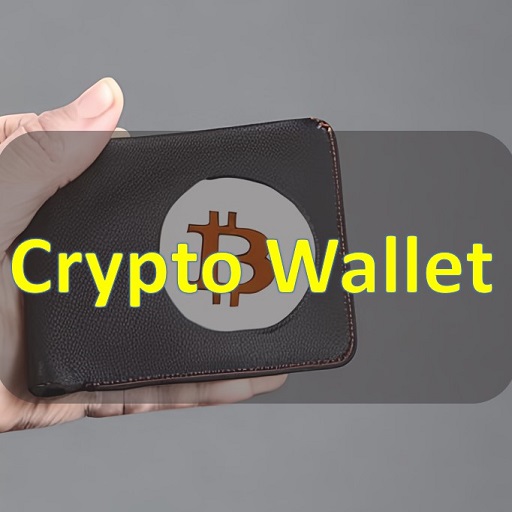A crypto wallet, also known as a cryptocurrency wallet, is a digital tool that allows users to securely store, manage, and interact with their cryptocurrencies. It’s a software application or a physical device that enables users to store their private keys, which are necessary for accessing and managing their cryptocurrency holdings.
Crypto wallets provide a way to store various types of cryptocurrencies, such as Bitcoin (BTC), Ethereum (ETH), Litecoin (LTC), and many others. These wallets generate and store the user’s private keys, which are essential for signing transactions and proving ownership of the cryptocurrency.
There are different types of crypto wallets:
Software Wallets
These wallets are software applications that you install on your computer or mobile device. They can be further classified into:
– **Desktop Wallets**: Installed on your computer or laptop, these wallets provide a high level of security. Examples include Exodus and Electrum.
– **Mobile Wallets**: Designed for smartphones, these wallets offer convenience and accessibility. Examples include Trust Wallet and Mycelium.
Web Wallets
These wallets are accessible through a web browser, and you can access them from any device with an internet connection. They are convenient but are generally considered less secure than other wallet types. Examples include MetaMask and MyEtherWallet.
Hardware Wallets
These wallets are physical devices specifically designed for storing cryptocurrencies securely. They provide an extra layer of protection by keeping the private keys offline. Examples include Ledger and Trezor.
Paper Wallets
These wallets involve generating and printing the private and public keys on a physical piece of paper. Paper wallets are considered offline or “cold” storage and offer a high level of security. However, they require caution to ensure the paper is not lost, damaged, or accessed by unauthorized individuals.
It’s important to note that while wallets provide a secure means to store and manage cryptocurrencies, they do not actually store the coins themselves. Cryptocurrencies exist on their respective blockchains, and wallets enable users to access and interact with those assets securely.
When choosing a crypto wallet, it’s essential to consider factors such as security features, ease of use, compatibility with the cryptocurrencies you hold, and the reputation of the wallet provider. It’s also crucial to follow best practices for securing your wallet, such as using strong passwords, enabling two-factor authentication, and keeping your wallet software up to date.
How does the crypto wallet work?
Crypto wallets work by utilizing cryptographic algorithms to generate and manage pairs of cryptographic keys: a public key and a private key. These keys are essential for interacting with cryptocurrencies on the blockchain.
Here’s a step-by-step overview of how a typical crypto wallet works:
Key Generation
When you create a crypto wallet, it generates a unique pair of cryptographic keys. The public key is derived from the private key using mathematical algorithms.
Public Key
The public key is a randomly generated alphanumeric string that serves as your wallet’s address. It’s publicly visible and can be shared with others to receive cryptocurrencies.
Private Key
The private key is a randomly generated, secret alphanumeric string. It should be kept secure and never shared with anyone. The private key is used to sign transactions and prove ownership of the cryptocurrencies associated with the wallet.
Address Generation
The wallet software generates a unique wallet address based on the public key. This address is used to receive funds from other users.
Receiving Cryptocurrencies
When someone sends cryptocurrencies to your wallet address, they create a transaction on the blockchain. The transaction includes your wallet address as the recipient and is digitally signed using the sender’s private key.
Accessing Funds
To access the cryptocurrencies associated with your wallet, you need to use your private key. Wallet software allows you to import or enter your private key to sign transactions and prove ownership.
Transaction Signing
When you want to send cryptocurrencies from your wallet to another address, the wallet software creates a transaction, including the recipient’s address and the amount. The transaction is then signed with your private key, verifying that you are the owner of the funds and authorizing the transfer.
Broadcasting Transactions
The signed transaction is sent to the respective blockchain network and propagated to the network’s nodes. Miners validate and confirm the transaction, adding it to a new block on the blockchain.
Wallet Balance and History
Wallet software keeps track of your cryptocurrency balance by scanning the blockchain for transactions involving your wallet address. It displays your balance and transaction history, allowing you to monitor your funds.
Security Measures
Crypto wallets employ various security measures to protect your private keys and ensure the safety of your funds. This can include encryption of the private keys, passphrase or PIN protection, and integration with hardware security modules (in the case of hardware wallets). It’s crucial to choose a reputable wallet provider and follow recommended security practices to safeguard your assets.
Compatibility
Different cryptocurrencies use various blockchain protocols and may require specific wallet software to interact with them. Wallets are designed to be compatible with specific cryptocurrencies or a range of them. Ensure that the wallet you choose supports the cryptocurrencies you intend to store and manage.
Network Connectivity
Wallets may require an internet connection to synchronize with the blockchain network and retrieve information about your transactions and balances. However, some wallets, such as hardware wallets or certain software wallets, can operate in an offline or air-gapped mode to enhance security.
Blockchain Integration
Wallet software integrates with the respective blockchain network of the supported cryptocurrencies. It communicates with the network to send and receive transactions, check balances, and retrieve transaction history. Wallets typically connect to the network through nodes or servers that maintain copies of the blockchain.
Backup and Recovery
It’s essential to back up your wallet’s private keys or recovery seed phrase. This backup ensures that even if your device is lost, damaged, or compromised, you can restore your wallet and regain access to your funds. Wallet software often provides a backup mechanism or a recovery phrase that you must securely store in a separate location.
Multi-Wallet Management
Some wallet software allows you to manage multiple wallets within a single application. This feature is particularly useful if you hold different cryptocurrencies or want to separate funds for different purposes. It simplifies wallet management and provides a centralized interface for accessing multiple wallets.
Interoperability
With the growth of decentralized finance (DeFi) and blockchain interoperability, some wallets enable users to interact with multiple blockchain networks and protocols. This allows you to manage and swap different cryptocurrencies without needing separate wallets for each one.
Blockchain Synchronization
When you set up a crypto wallet, it needs to synchronize with the blockchain network to fetch the latest transaction history and determine your wallet’s current balance. This synchronization process varies depending on the wallet type and the blockchain network involved. It can take some time, especially for wallets that need to download the entire blockchain.
Token Support
In addition to supporting cryptocurrencies, wallets may also offer compatibility with tokens built on top of blockchain platforms. For example, Ethereum-based wallets can store and manage various ERC-20 tokens, which are tokens built on the Ethereum blockchain.
Decentralized Applications (DApps)
Some wallets, particularly those designed for specific blockchain networks like Ethereum, provide integration with decentralized applications or DApps. These wallets enable users to interact seamlessly with DApps, such as decentralized exchanges, lending platforms, and games, directly from their wallet interface.
Transaction Fees
When you send cryptocurrencies from your wallet, you may need to pay transaction fees. These fees are required to incentivize miners or validators to include your transaction in the blockchain. Wallets typically provide an estimation of the transaction fees based on the current network conditions, allowing you to adjust the fee according to your desired transaction speed.
Offline Transactions
Some wallets, especially hardware wallets, enable you to sign transactions offline. This feature adds an extra layer of security by keeping the private key offline and preventing it from being exposed to potentially compromised devices or networks. You can sign the transaction offline and then broadcast it to the network using a separate online device.
Wallet Interoperability
In certain cases, wallets can be interoperable, allowing users to import or export their private keys or recovery phrases between different wallet providers. This feature provides flexibility and allows users to switch between wallets while maintaining control over their funds.
Ongoing Development
Crypto wallet technology continues to evolve, with ongoing development and updates to enhance security, user experience, and feature sets. It’s advisable to keep your wallet software up to date to ensure you have the latest security patches and improvements.
Third-Party Integration
Some wallets offer integrations with external services, such as cryptocurrency exchanges, portfolio trackers, and tax reporting platforms. These integrations provide additional convenience and functionality by allowing users to access multiple services from a single wallet interface.
Staking and Delegating
Some wallets support staking and delegation features for certain proof-of-stake (PoS) cryptocurrencies. Staking involves locking up a certain amount of cryptocurrency in a wallet to support the network’s operations and earn staking rewards. Delegating allows users to participate in staking without needing to run their own network node. Wallets with staking capabilities provide an intuitive interface for users to stake their funds and participate in network consensus.
Privacy and Anonymity
Privacy-focused cryptocurrencies offer features to enhance user privacy and anonymity. Wallets designed for such cryptocurrencies may incorporate additional privacy features, such as coin mixing, stealth addresses, and encrypted transactions. These features aim to obfuscate transaction details and protect user identities.
Mobile Wallet NFC Payments
Some mobile wallets support Near Field Communication (NFC) technology, allowing users to make contactless payments with cryptocurrencies at NFC-enabled payment terminals. This feature adds convenience for users who want to spend their cryptocurrencies for real-world purchases.
Community Development
Many crypto wallets are open-source projects, which means their source code is freely available for review and contribution by the community. Open-source wallets benefit from community-driven development, peer review of code, and transparency, which can enhance their security and trustworthiness.
Backup Options
Wallets often provide multiple backup options for added security. This can include backup to cloud storage, external storage devices (such as USB drives), or printing paper wallets. Having multiple backups helps ensure that you can recover your wallet and funds even if one backup method fails or is inaccessible.
Support for Hard Forks and Airdrops
When a cryptocurrency undergoes a hard fork or when a new cryptocurrency is distributed through an airdrop, wallet providers may release updates to support the new tokens. By keeping your wallet software up to date, you can ensure compatibility with such events and claim any newly generated tokens.
Cryptocurrency Exchange Integration
Some wallets offer integration with cryptocurrency exchanges, allowing users to seamlessly trade and swap cryptocurrencies within the wallet interface. This feature eliminates the need to transfer funds to an external exchange and simplifies the trading process for users.
Multi-Signature (Multisig) Wallets
Multisig wallets require multiple signatures or approvals from different parties to authorize a transaction. This adds an extra layer of security by reducing the risk of a single point of failure or compromised key. Multisig wallets are commonly used for corporate accounts, joint accounts, or to distribute funds based on predefined rules.
As the cryptocurrency ecosystem continues to evolve, crypto wallets will likely incorporate new features and innovations to enhance security, usability, and integration with emerging technologies. It’s always recommended to stay informed about the latest wallet developments and best practices to ensure the safe management of your cryptocurrencies.
How to determine which is the best crypto wallet for us?
Determining the best crypto wallet for you depends on several factors. Here are some considerations to help you evaluate and choose a suitable wallet:
Security
Security is of utmost importance when it comes to crypto wallets. Look for wallets that prioritize strong security measures such as encryption, two-factor authentication (2FA), biometric authentication, and hardware wallet integration. Consider the wallet’s track record and reputation for security.
Type of Wallet
Consider which type of wallet aligns with your needs. Software wallets provide convenience and accessibility, while hardware wallets offer enhanced security. Paper wallets are another option if you prioritize offline storage. Choose a wallet type that suits your preferences and requirements.
Supported Cryptocurrencies
Ensure that the wallet you choose supports the specific cryptocurrencies you want to store and manage. Different wallets have varying levels of compatibility with different cryptocurrencies and tokens. Verify that your desired cryptocurrencies are supported by the wallet.
User Experience and Interface
Evaluate the user experience and interface of the wallet. A user-friendly and intuitive interface can make it easier for you to manage your cryptocurrencies effectively. Look for wallets with clear navigation, easy transaction management, and a well-designed interface.
Development and Updates
Consider the development team behind the wallet and the frequency of updates. Active development and regular updates indicate that the wallet is being actively maintained, improving security, adding new features, and addressing potential vulnerabilities.
Backup and Recovery
Check if the wallet provides robust backup and recovery options. Having a reliable backup mechanism is crucial in case of device loss, damage, or accidental deletion. Look for wallets that offer backup options such as recovery seed phrases or private key exports.
Community and Support
Assess the wallet’s community and support channels. Active communities, forums, and responsive customer support can be beneficial if you encounter any issues or have questions regarding the wallet. Engaging with a supportive community can provide valuable insights and assistance.
Mobile or Desktop
Consider whether you prefer a mobile wallet or a desktop wallet. Mobile wallets provide convenience and portability, while desktop wallets may offer more advanced features and enhanced security. Decide based on your usage patterns and preferences.
Reviews and Recommendations
Research and read reviews about different wallets to gain insights from other users’ experiences. Look for independent reviews from reputable sources and consider recommendations from trusted individuals who have experience with crypto wallets.
Reputation and Trust
Trustworthiness is vital when selecting a wallet. Consider the wallet provider’s reputation in the crypto community. Look for wallets that have been established for a considerable period and have gained positive feedback from users.
Third-Party Integration
Consider whether the wallet integrates with other services or platforms that you frequently use. For example, if you actively trade cryptocurrencies on specific exchanges, check if the wallet supports direct integration with those exchanges. Integration with portfolio trackers or tax reporting tools can also be beneficial for managing your overall crypto holdings.
Ease of Use
Evaluate the user-friendliness of the wallet. Look for wallets with straightforward setup processes, intuitive interfaces, and clear instructions for performing common tasks like sending and receiving cryptocurrencies. A wallet that is easy to use can help reduce the chances of user errors and improve overall user experience.
Privacy Features
If privacy is a priority for you, consider wallets that offer privacy-focused features. Some wallets support features like coin mixing, anonymous transactions, or integration with privacy-focused cryptocurrencies. Assess the level of privacy offered by the wallet and ensure it aligns with your privacy preferences.
Offline Storage and Cold Storage Options
Assess whether the wallet supports offline storage options or cold storage solutions. Offline storage, such as hardware wallets or paper wallets, can provide enhanced security by keeping your private keys offline and away from potential online threats. If you prioritize maximum security, look for wallets that offer these features.
Community Audit and Code Transparency
Open-source wallets allow for community auditing of the code, which can enhance security and provide transparency. Check if the wallet’s code has been audited by independent security experts or if the development team actively invites community participation in code review. Transparency in code development can inspire confidence in the wallet’s security practices.
Scalability and Future Development
Consider the wallet’s ability to scale and adapt to future advancements in the crypto space. Look for wallets that have a roadmap for continued development and are actively working on incorporating new features or supporting upcoming blockchain upgrades. This ensures that your chosen wallet remains relevant and up to date in the rapidly evolving crypto landscape.
Costs and Fees
Evaluate the costs and fees associated with using the wallet. Some wallets are free to use, while others may charge transaction fees or offer premium features at a cost. Assess the fee structure and compare it with other wallets to determine if the associated costs are reasonable and align with the wallet’s features and benefits.
Regulatory Compliance
Depending on your jurisdiction and personal preferences, you may want to consider wallets that comply with regulatory requirements, such as Know Your Customer (KYC) regulations. Compliance with regulations can provide an added layer of legitimacy and security, but it may come with certain trade-offs in terms of privacy and user anonymity.
Remember, it’s generally advisable to start with small amounts of cryptocurrency when testing out a new wallet. This allows you to become familiar with the wallet’s features and security measures before transferring larger amounts. Conduct thorough research, review different wallet options, and consider your specific needs to choose the best crypto wallet for you.







